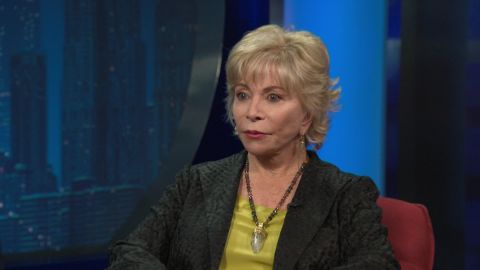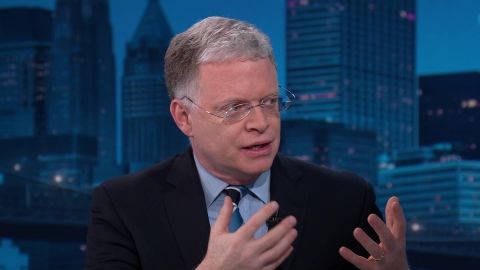Read Transcript EXPAND
CHRISTIANE AMANPOUR: So, refugees and the immigrant struggle are also at the heart of our next conversation. Award-winning author Isabel Allende was forced into exile after her uncle, the former Chilean President Salvador Allende, was overthrown in a coup. Her new historical novel, “A Long Petal of the Sea,” tells the story of a couple fleeing the 1930s Spanish Civil War on an old cargo ship. It was arranged by the famous Chilean poet Pablo Neruda. Allende tells our Walter Isaacson about how writing helps soothe her own experience as an exile, and also the pain of losing her daughter.
(BEGIN VIDEOTAPE)
WALTER ISAACSON: Isabel Allende, thank you for joining us.
ISABEL ALLENDE, AUTHOR, “A LONG PETAL OF THE SEA”: Well, thank you for having me, Walter.
ISAACSON: I had a wonderful time reading “A Long Petal of the Sea.” And it has a theme that you have in so many of your novels, which is people escaping oppression and trying to find liberation. Tell me, in some ways, near the end of the book, you talk about making an assessment of life at age 80 or so. Are you making an assessment of your life with books like this?
ALLENDE: No, I just want to tell a story. And then I realize, after the book is finished, that I have been exploring some part of myself, but that’s not the intention when I start writing.
ISAACSON: But you have the polite of the migrant yourself. You’re somebody who had to leave Chile when your relative, Salvador Allende, was overthrown. You become a refugee.
ALLENDE: I went to Venezuela with the idea that I would stay there for a little bit and go back to Chile. But the dictatorship lasted 17 years. And the number is very interesting, Walter, because, according to statistics, the time a refugee spends away from home is between 17 and 25 years. And those who return usually return to a country that they don’t recognize, where they have no place, and they go back without their children or grandchildren, who belong in another place.
ISAACSON: But in this book, your wonderful characters Victor Rosera, they go back to Chile, right?
ALLENDE: They go back first to their own land. They go back to Spain after Franco’s death.
ISAACSON: Yes.
ALLENDE: And this is what happens to them. After 40 years, they don’t belong there. There’s nobody there that knows them. So, eventually, they return to Chile, realizing that their roots are now in this other place, Chile.
ISAACSON: It sort of reflects your own life as a refugee from oppression. Would you say, more importantly, it reflects our time?
ALLENDE: A time.
ISAACSON: Yes.
ALLENDE: I think it’s in the collective consciousness, like environment — environment, refugees. These are things that are in the air that affect us.
ISAACSON: Except for the refugee situation is so fraught, so politicized. I mean, Trump wants to build a wall. Others want to accept refugees. I mean, you are trying to sort of help people understand the plight of refugees?
ALLENDE: I’m not trying to deliver a message, but I know that if you know the person, you know the story, you know the name, you know why that person is seeking asylum, then it’s not a number anymore. Then it’s not a number that you can stop with a wall. It’s a human being that needs something that you can give.
ISAACSON: What do you think when you hear Trump’s rhetoric about build a wall?
ALLENDE: Well, whatever Trump says makes me sick. So, when he says that he wants to build a wall, is it — do they want to build walls all over the world, so that the poor and the desperate are left out? What kind of world do we want? Do we want a world for the privileged and another separate world for everybody else? No, I think we need to find global solutions. The problem of immigration and refugees is going to grow with climate change also, plus violence, plus poverty. And I think that, first, we need to find the causes, why people would leave everything they love, everything that is familiar to them, and go to another place in an adventure that probably ends badly and be received with hostility, if they are received at all? Why? Because they are desperate. So to put oneself in the place of that person would really help. Find the causes in the places of origin, why people have to leave, and try to solve that. They were no Syrian refugees before the war in Syria. And the situation in Central America, the desperate situation of people who are subject to narcos, gangs, corrupt government, failed governments, and we don’t remember that the CIA is responsible for many of those governments, for genocides in Central America, because they have supported the wrong people.
ISAACSON: Do you think that’s true of the CIA and your relative Salvador Allende?
ALLENDE: Well, of course the CIA was involved. But the CIA alone would not be able to do something like that without the support of the forces inside the country. They work with what is in the country already.
ISAACSON: But put yourself in the position around the world these days, whether it’s in the United States, or Britain, or in Europe or whatever. People are saying, wait, we can take all of these refugees that keep flooding in. What do we do about that?
ALLENDE: I think that we can find ways of incorporating them and trying to facilitate things, so that they can go back to the places of origin. Every refugee wants to go back. I mean, the situation of refugees is different from migrants. People who emigrate to another place usually are young. They are people who are looking for a better life. And they see the future. They have a vision of themselves in the future. And they usually contribute enormously to the places where they go. The United States is the best example of a country built with migrants. The refugee is someone who has been expelled from the — his place of origin, who’s looking back, who never quite adapt, because he’s hoping to go back and lives in the past.
ISAACSON: Does that describe you?
ALLENDE: It describes both moods, the mood of me as a political refugee and the mood of me as a migrant, because I am an immigrant in the United States. And when I came here, I came to stay and to contribute and to give something back. So it was a very different state of mind.
ISAACSON: Tell me the story when you were young and you are a translator translating–
ALLENDE: People have asked so much about that.
(LAUGHTER)
ISAACSON: But you get fired as a translator because?
ALLENDE: Because I changed a little bit the dialogue and sometimes and a little bit the ending. These were romance novels.
ISAACSON: But you changed the end of “Cinderella” to make it better.
ALLENDE: Well, because Cinderella was such a stupid character.
(LAUGHTER)
ALLENDE: She would put up with everything. Why? No, I wanted more feisty heroines.
ISAACSON: And you were influenced back then by reading the feminist writers of the ’70s. Did that help inform your writing?
ALLENDE: I don’t think it informed my writing when I was translating, because I have had this way of thinking since I was 5. There was no feminism in Chile when I was already a feminist. My mother thought that I had some mental problem and, probably, I needed some treatment, there maybe was something wrong with me. It was so rare to have someone thinking that male authority had to be questioned.
ISAACSON: Did becoming an exile change the way you were a writer?
ALLENDE: It made me a writer. I wouldn’t be a writer today if I had not left my country. I would be a journalist. I may be a lousy journalist, but still a journalist. I would be retired by now. I became a writer, I think, as an exercise in nostalgia, trying to recover the world I had lost, get back the people who were dispersed all over, the memories that were beginning to fade.
ISAACSON: And one of the most wrenching lines is when you do that with your daughter who died. Describe that process.
ALLENDE: My daughter had a rare condition called porphyria that should not be fatal. She was in Spain. There was neglect in the hospital. She ended up in a coma first and then with severe brain damage. And, first, the hospital hid the whole thing for months. And when , finally, they gave me back my daughter, she was like a — almost like a corpse. This was before 9/11. And I was able to bring her in a commercial United flight all the way from Spain to California, where I live, and I took care of her at home. And after she died, I wrote a book that is a memoir. And the reason why I wrote the book is because that year of my daughter in a coma was like a long night. I couldn’t differentiate one day from the other. It seemed that it was all one big sorrow. And writing the book, I wrote the book with 180 letters that I had written to my mother that she returned to me, and some notes that I had taken in the hospital, so I could go day by day. And then I understood what had happened. I could see the journey and realized that the only way out for my daughter was to death, and accepted and mourn in the — with the writing. That helped me a lot. So this happened many years ago. And I still get letters, many letters, from people who read the book and connect to Paula because everybody has losses. And it could be different losses. But we connect to some — to the pain and the loss of another person if we get to hear the story intimately. That’s what I try to do with my books. When I have two protagonists that are refugees, I’m not trying to preach .I’m just trying to connect these people, you, to the reader.
ISAACSON: When you do a historical book, like this one, it’s based on a Pablo Neruda, who was a great poet, who I think was a influence on you growing up in terms of being a wonderful poet, from there. He decides to get a ship called the Wilmington to–
ALLENDE: The Winnipeg.
ISAACSON: Winnipeg — sorry — to bring people from the fascist takeover during the Spanish Civil War as refugees to Chile. How much of this is historical reporting? And how much of it is sort of the fiction you put around it?
ALLENDE: Well, all the historical facts are true. They are not alternative facts. They are facts.
(LAUGHTER)
ALLENDE: And I have written several historical novels. And if I get my documentation, my research well done, then that’s the foundation where I can build the fiction .But all the basic, the theater where my characters will move, is very well-researched. So, Pablo Neruda convinced the government of Chile to receive the migrants, against the public opinion of the right wing and the church, who didn’t want them, although the people in Chile were very — they really were following the civil war. And they really accepted these immigrants with open arms.
ISAACSON: By the way, that sort of feels like today here, where–
ALLENDE: The narrative is the same, Walter, the narrative of the right wing and the church in Chile in 1939, 80 years ago, the same, that the migrants were communist, anarchists, rapists, criminals, thieves, that they will take away the jobs, that they would profit from welfare, exactly the same narrative.
ISAACSON: Is that part of the reason you wrote it?
ALLENDE: No, I didn’t know that until I read the newspapers of Chile of the time, and what? We’re repeating exactly the same thing 80 years later.
ISAACSON: When you see that in your historical research, do you sort of say, how can I make people today understand this emotion that’s been going on for all refugees?
ALLENDE: Walter, what is the reach of a book? Do you think that I can change anybody’s mind? The press, television, politicians, those are the people who can really change people’s minds. How many people read a book? How many people read a book with an open heart? Few.
ISAACSON: Well, let me answer that question, which is 75 million copies of your book.
ALLENDE: Well, but that is 30-something years.
ISAACSON: Right.
(LAUGHTER)
ISAACSON: You have quite an influence. You’re probably the bestselling author in the Spanish language. Is that–
ALLENDE: That’s what they say.
ISAACSON: Well, let’s–
ALLENDE: Who can prove that?
ISAACSON: Yes, I don’t know.
(LAUGHTER)
ISAACSON: But let’s say it. Do you think, sometimes, you get pushback from the intellectual elite because you’re actually so popular and such a bestseller?
ALLENDE: Yes, and — probably, but it doesn’t matter. I mean, everybody gets bad reviews. Everybody gets — there is an element also of, I would say, the fact that I’m a woman writer also makes me — forces me to do double the effort of any man to get half the recognition. And that is in every field, science, business and also, of course, art.
ISAACSON: Do you think being a woman helps you understand that theme of oppression and liberation that goes through all your books?
ALLENDE: No, I think a man can understand it also just as well. I think that I can relate better to — what I think I’m good at is relationships, is the relationships between the characters. That’s my forte, I think, and that’s why I have so many following — I mean, such a great following among women, because, for us, for women, relationships are very important, much more than a career or a place in the world or legacy or — those are male ideas. We — for us — I’m generalizing, of course. But, for us, it’s how we connect.
ISAACSON: The relationship in this book between Victor and Rosera–
ALLENDE: Roser.
ISAACSON: Roser. It’s an odd relationship.
ALLENDE: Very odd, because it’s exactly the opposite of how most love affairs are. It begins with a great passion, and then it turns into — in the best scenario, it turns into a long, good relationship that is more friend — like a friendship. And, usually, it ends in a marriage of convenience, because why would you divorce? Everything is OK. It would be worse to be alone. This is exactly the opposite. They marry for convenience, because they have to get on the ship. Then they have years and years of this friendship that is what I described as being companions. And, at the end, they fall madly in love. And some people have asked me, do you think that it’s possible to fall madly in love when you are old? Well, I’m 77, Walter, and I’m madly in love.
ISAACSON: You just got married.
ALLENDE: Yes, I just got married. So, it’s possible.
(LAUGHTER)
ISAACSON: Congratulations.
ALLENDE: Yes. It doesn’t — it’s not different from falling in love when you are 20. The only difference is that you don’t have time. So–
(LAUGHTER)
ALLENDE: No. And it’s important because you realize that you have a sense of urgency, that you can’t waste any time. You have no time to wait. You get married, and you try to make it work. And there’s no time for pettiness, for little quarrels, for jealousy, for impatience or intolerance, for all the things that ruin relationships.
ISAACSON: What do you think? People could read your books. Everybody in America could read it. What do you think would come away in their heart that would make this country better?
ALLENDE: Walter, I think that the reader sees in the book what they already have inside. And I can say this because I get so much mail, and for so many years. And I — when I read the letter, I realize that when the person says, well, you changed my mind, you made me think this way, you made — I realized that that person always had that in their heart or in their mind, and the book just brought it out. And that’s the connection. If the person doesn’t have that inside, nothing that I write, nothing that I say will change their minds.
ISAACSON: But your books tend to appeal to the better angels of our nature–
ALLENDE: Because they are there. The better angels are already inside, Walter. I can’t create them. I can just remind people that they have them inside.
ISAACSON: Isabel Allende, thank you so very much for being with us.
ALLENDE: Oh, thank you, Walter. Thank you. Thank you.
About This Episode EXPAND
Journalist David Rohde explains why he describes Attorney General William Barr as President Trump’s “sword and shield.” Comedian Kumail Nanjiani and writer Emily V. Gordon sit down with Christiane to discuss their new show “Little America.” Novelist Isabel Allende joins Walter Isaacson to discuss immigration, loss and her new novel “A Long Petal of the Sea.”
LEARN MORE


